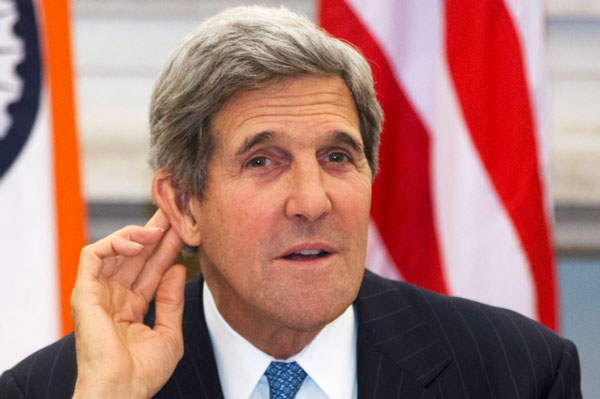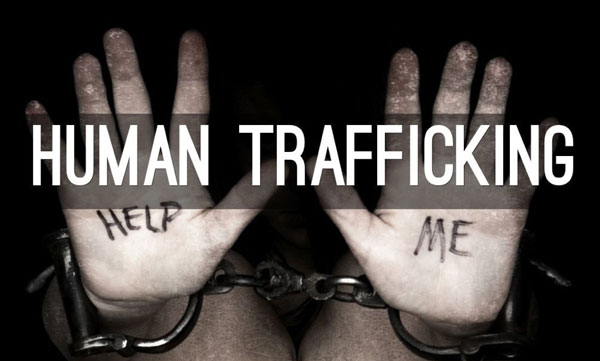By Nelson A. King
WASHINGTON, – Stating that ending modern slavery is not just a fight that should be attempted but a fight that must be won, United States Secretary of State John Kerry on Thursday issued the 2016 Trafficking in Persons Report (TIP), assailing a number of Caribbean Community (CARICOM) countries for not doing enough to address the issue.
The TIP Report is the US Government’s principal diplomatic tool to engage foreign governments on human trafficking. It is also the world’s most comprehensive resource of governmental anti-human trafficking efforts, and reflects the US Government’s commitment to global leadership on “this key human rights and law enforcement issue.”
The State Department placed Belize, Haiti and Suriname on its Tier 3 list; and Antigua & Barbuda, St. Lucia, St. Vincent & The Grenadines, and Trinidad & Tobago on Tier 2 Watch List.
Barbados, Guyana and Jamaica are on the Tier 2 list, while the Bahamas is the sole CARICOM nation on the Tier 1 list.
Countries on Tier 3 list are those whose governments do not fully meet the minimum standards and are not making significant efforts to do so, the State Department said.
Tier 2 Watch List countries are those whose governments do not fully meet minimum standards but are making significant efforts to meet those standards, and the absolute number of victims of severe forms of trafficking is very significant or is significantly increasing.
In addition, the State Department said countries on the Tier 2 Watch List failed to provide evidence of increasing efforts to combat severe forms of trafficking in persons from the previous year, including increased investigations, prosecutions and convictions of trafficking crimes, increased assistance to victims, and decreasing evidence of complicity in severe forms of trafficking by government officials.
According to the State Department, Tier 1 countries are those whose governments fully meet the Trafficking Victims Protection Act’s (TVPA) minimum standards.
The report said Lesbian, Gay, Bisexual, Transgender and Intersex (LGBTIO) men, women, and children are vulnerable to sex and labour trafficking.
It said foreign men, women, and children—particularly from Central America, Mexico, and Asia—migrate voluntarily to Belize in search of work and are “often exploited by traffickers who recruit victims using false promises of relatively high-paying jobs.”
Additionally, the report said some migrants are subjected to forced labour in restaurants, shops, agriculture and fishing or to sex trafficking.
“Trafficking-related complicity by government officials, including those at high levels, remains a problem,” the report said. “The Government of Belize does not fully meet the minimum standards for the elimination of trafficking and is not making significant efforts to do so.”
The State Department said Haiti is a source, transit and destination country for men, women and children subjected to forced labour and sex trafficking.
It said most of Haiti’s trafficking cases involve children in domestic servitude, “who often are physically abused, receive no payment for services rendered, and may be kept from school.
The report said a significant number of children flee employers’ homes or abusive families and become street children.
The State Department pointed to a May 2015 UN report that documented that members of its peacekeeping mission in Haiti “sexually exploited more than 225 Haitian women in exchange for food, medication, and household items between 2008 and 2014.”
The report said female foreign nationals, particularly citizens of the Dominican Republic, are particularly vulnerable to sex trafficking and forced labor in Haiti.
It said other vulnerable populations include Haitian children working in construction, agriculture, fisheries, domestic work, and street vending in Haiti and the Dominican Republic; women and children living in camps for internally displaced persons set up as a result of the 2010 earthquake; and members of female-headed or other single-parent families.
Other vulnerable populations are children in private and non-governmental organization (NGO-sponsored residential care centres; and Haitians without documentation, including those returning from the Dominican Republic or The Bahamas.
The report said Haitian adults and children are vulnerable to fraudulent labour recruitment and are subject to forced labour, primarily in the Dominican Republic, other Caribbean countries, South America, and the United States.
“Having been placed on Tier 2 Watch List in the preceding four years, Haiti is not making significant efforts to meet the minimum standards and is, therefore placed, on Tier 3.”
The State Department said women and girls from Suriname, Brazil, Dominican Republic, Guyana and Venezuela are subjected to sex trafficking in Suriname, including in remote and illegal gold mining camps in Suriname’s interior.
During the reporting period, authorities discovered parents who subjected their daughters to sex trafficking, citing increasing poverty as the cause, the State Department said.
It said Venezuela’s deteriorating economy “may render Venezuelan women more vulnerable to sex trafficking in Suriname.
“Officials note a shift towards in-home brothels makes such establishments—and cases of possible sex trafficking—harder to detect.”
The report added that migrant workers in agriculture and on fishing boats off Suriname’s coast are highly vulnerable to forced labour, as are children working in gold mines and informal urban sectors.
It said, Chinese associations—and allegedly some Hong Kong traffickers—recruit and subject Chinese immigrants to sex and labour trafficking in the mining, service and construction sectors, the report said.

It also said Surinamese women in neighbouring countries and territories engage in prostitution “and may be vulnerable to sex trafficking.”
The report said legal and undocumented immigrants from the Caribbean region, “notably from Jamaica, Guyana, Haiti, and the Dominican Republic, as well as from Southeast Asia, are most vulnerable to trafficking” in Antigua and Barbuda.
The trafficking in persons committee reported sex trafficking in bars, taverns and brothels in Antigua and Barbuda. The State Department said there are anecdotal reports that children are subjected to sex trafficking, including by parents and caregivers.
It said forced labour occurs in domestic service and the retail sector.
“Credible sources reiterated concerns of possible trafficking-related complicity by police officers, such as officials facilitating movement of a trafficking victim by receiving them at the airport, collaborating with the trafficker in the movement of a victim, and providing security for an establishment involved in trafficking,” the State Department claimed.
“The police reported that traffickers changed tactics, remitting a greater portion of the proceeds to victims and allowing victims to keep their passports, making it difficult to investigate cases,” it added.
The State Department said documented and undocumented immigrants from the Caribbean and South Asia, including domestic workers, are the groups most vulnerable to human trafficking in St. Lucia.
It said local and foreign children are subjected to sex trafficking, including by parents and caregivers.
It was also noted that women in prostitution are vulnerable to sex trafficking and non-governmental organizations (NGOs) reported that disadvantaged young women from rural areas are vulnerable to sex trafficking.
The report said, according to the St. Lucia Government, business owners from St. Lucia, India, China, Cuba and Russia are the most likely trafficking perpetrators in the country.
“The Government of St. Lucia does not fully meet the minimum standards for the elimination of trafficking; however, it is making significant efforts to do so,” the State Department said.
“Despite these measures, the government did not demonstrate overall increasing anti-trafficking efforts compared to the previous reporting period; therefore St. Lucia is placed on Tier 2 Watch List,” it, however, added.
In St. Vincent and the Grenadines, the State Department said NGOs and government officials report some adults pressure local minors into sex trafficking.
It said one NGO reported that local minors are subjected to sex trafficking by tourists in the Grenadines, but added that local authorities have not identified any cases.
The report said foreign women engaged in prostitution are subjected to trafficking for sex, and that foreign workers from South America and the Caribbean are subjected to trafficking for forced labor both in St. Vincent and the Grenadines or while transiting through.
However, the government and NGOs reported the number of women from other Caribbean islands subjected to sex trafficking decreased during the last few years, according to the State Department.
It said foreign workers employed by small, foreign-owned companies in St. Vincent and the Grenadines are particularly vulnerable to labour trafficking.
The report said men, women and children are vulnerable to forced labour, primarily in agriculture, stating that “government officials and civil society suspect drug traffickers subject workers to forced labour in the production of marijuana.
“NGOs and government officials report attempts to subject Vincentians to trafficking for both forced labour and commercial sexual exploitation in foreign countries,” the report said. “The Government of St. Vincent and the Grenadines does not fully meet the minimum standards for the elimination of trafficking; however, it is making significant efforts to do so.
“Despite these measures, the government did not demonstrate overall increasing anti-trafficking efforts compared to the previous reporting period; therefore, St. Vincent and the Grenadines is placed on Tier 2 Watch List for the third consecutive year,” it added.
In Trinidad and Tobago, the State Department said women and girls from the Dominican Republic, Guyana, Venezuela and Colombia are subjected to sex trafficking in brothels and clubs, “often lured by offers of legitimate employment, with young women from Venezuela especially vulnerable.”
The report said new brothels continue to open across the twin-island republic, “particularly in the east, where they are incorporated into small bars and rum shops, and are difficult to detect.
“NGO and police sources note that both prostitution and trafficking are historically dependent on police corruption,” the report said. “Law enforcement and civil society organizations reported some police and immigration officers facilitate trafficking and some law enforcement officials exploit sex trafficking victims.
The authorities and NGOs report foreign women have been forced into prostitution in Barbados, according to the State Department, adding that foreigners are subjected to forced labour, most notably in domestic service, agriculture and construction.
The report said legal and undocumented immigrants from Jamaica and Guyana are especially vulnerable to trafficking, stating that child sex trafficking also occurs in Barbados.
“There are anecdotal reports by authorities and NGOs that children are subjected to sex trafficking, including by parents and caregivers,” the report said.
It said women and children from Guyana, Brazil, the Dominican Republic, Suriname and Venezuela are subjected to sex trafficking in mining communities in the interior and urban areas of Guyana.
The report said that victims in Guyana are subjected to forced labour in the mining, agriculture and forestry sectors, as well as in domestic service and shops.
The State Department said while both sex trafficking and forced labour occur in interior mining communities, limited Guyana government presence in the country’s interior “renders the full extent of trafficking unknown.”
The State Department added that children are particularly vulnerable to sex and labour trafficking, and that Guyanese nationals are subjected to sex and labour trafficking in Jamaica, Suriname and other Caribbean countries.
“Some police officers are complicit in trafficking crimes, and corruption impedes anti-trafficking efforts,” the report charged.
It said sex trafficking of Jamaican women and children reportedly occurs on streets and in night clubs, bars, massage parlours and private homes, including in resort towns.
The State Department said Jamaican citizens have been subjected to sex trafficking and forced labour abroad, including in other Caribbean countries, Canada, the United States and the United Kingdom.
The report said communities vulnerable to sex trafficking and forced labour include residents of Jamaica’s poverty-stricken areas “effectively controlled by criminal ‘dons,’ and workers in the informal sector, particularly on family farms and in markets and shops.”
Child domestic workers may be subject to domestic servitude, the report said.
It said many children are reported missing in Jamaica, with some of these children subjected to forced labour or sex trafficking. (CMC)













